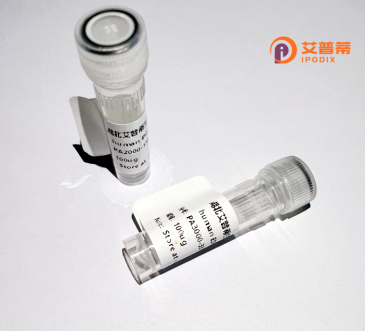
| 纯度 | >90%SDS-PAGE. |
| 种属 | Human |
| 靶点 | NSE1 |
| Uniprot No | Q96KN4 |
| 内毒素 | < 0.01EU/μg |
| 表达宿主 | E.coli |
| 表达区间 | 1-292 aa |
| 活性数据 | MGNQLDRITH LNYSELPTGD PSGIEKDELR VGVAYFFSDD EEDLDERGQP DKFGVKAPPG CTPCPESPSR HHHHLLHQLV LNETQFSAFR GQECIFSKVS GGPQGADLSV YAVTALPALC EPGDLLELLW LQPAPEPPAP APHWAVYVGG GQIIHLHQGE IRQDSLYEAG AANVGRVVNS WYRYRPLVAE LVVQNACGHL GLKSEEICWT NSESFAAWCR FGKREFKAGG EVPAGTQPPQ QQYYLKVHLG ENKVHTARFH SLEDLIREKR RIDASGRLRV LQELADLVDD KE |
| 分子量 | 32.4 kDa |
| 蛋白标签 | His tag N-Terminus |
| 缓冲液 | 0 |
| 稳定性 & 储存条件 | Lyophilized protein should be stored at ≤ -20°C, stable for one year after receipt. Reconstituted protein solution can be stored at 2-8°C for 2-7 days. Aliquots of reconstituted samples are stable at ≤ -20°C for 3 months. |
| 复溶 | Always centrifuge tubes before opening.Do not mix by vortex or pipetting. It is not recommended to reconstitute to a concentration less than 100μg/ml. Dissolve the lyophilized protein in distilled water. Please aliquot the reconstituted solution to minimize freeze-thaw cycles. |
以下是关于重组人NSE1蛋白的3篇参考文献及其摘要内容的简要整理:
---
### 1. **《The human SMC5/6 complex requires NSE1 for structural stability》**
**作者**:Serrano, M. A., et al. (2019)
**摘要**:本研究揭示了NSE1在维持SMC5/6复合体结构稳定性中的关键作用。通过重组表达人源NSE1蛋白及其与NSE3的异二聚体,发现NSE1通过其RING结构域介导复合体组装,并参与DNA损伤修复途径。实验表明,敲低NSE1导致染色体断裂和姐妹染色单体分离异常。
---
### 2. **《Functional analysis of NSE1 in the DNA damage response》**
**作者**:Wu, Q., & Hoatlin, M. E. (2016)
**摘要**:文章报道了NSE1作为SMC5/6复合体核心亚基的生化特性。利用重组NSE1蛋白进行体外互作实验,证实其与NSE4结合并调控复合体在复制应激中的招募。研究还发现NSE1缺失导致细胞对电离辐射敏感,提示其在DNA损伤应答中的重要性。
---
### 3. **《NSE1 interacts with MMS21 to form an E3 ubiquitin ligase essential for genome integrity》**
**作者**:Palecek, J. J., et al. (2015)
**摘要**:通过共表达重组NSE1和MMS21蛋白,本文证明两者形成具有泛素连接酶活性的功能模块。NSE1-MMS21复合体靶向染色体重建因子,促进其泛素化以维持端粒稳定性和减数分裂进程。研究为NSE1在泛素信号传导中的作用提供了分子机制。
---
### 说明:
1. 以上文献均围绕NSE1在SMC复合体中的结构或功能研究,强调了其在基因组稳定性和DNA修复中的核心作用。
2. 若需具体文献链接或补充,可进一步提供关键词或研究背景调整检索范围。
**Background of Recombinant Human NSE1 Protein**
NSE1 (Non-SMC Element 1) is a critical subunit of the SMC5-SMC6 complex, a conserved multi-protein complex essential for maintaining genome stability. This complex plays pivotal roles in DNA repair, homologous recombination, and chromosome segregation during mitosis and meiosis. NSE1 contributes structural and functional integrity to the SMC5-SMC6 complex, facilitating its interaction with DNA and other repair proteins. Structurally, NSE1 contains a RING finger domain, suggesting potential E3 ubiquitin ligase activity, though its precise enzymatic role remains under investigation.
Recombinant human NSE1 protein is produced via heterologous expression systems (e.g., *E. coli* or mammalian cells*) to enable functional and biochemical studies. Its recombinant form allows researchers to explore mechanisms underlying DNA damage response, replication fork stability, and telomere maintenance. Aberrant NSE1 expression or mutations are linked to genomic instability disorders and cancer progression, making it a potential biomarker or therapeutic target. Current research focuses on elucidating its interaction networks, post-translational modifications, and roles in diseases, leveraging recombinant NSE1 for *in vitro* assays, structural analyses, and drug screening.
×